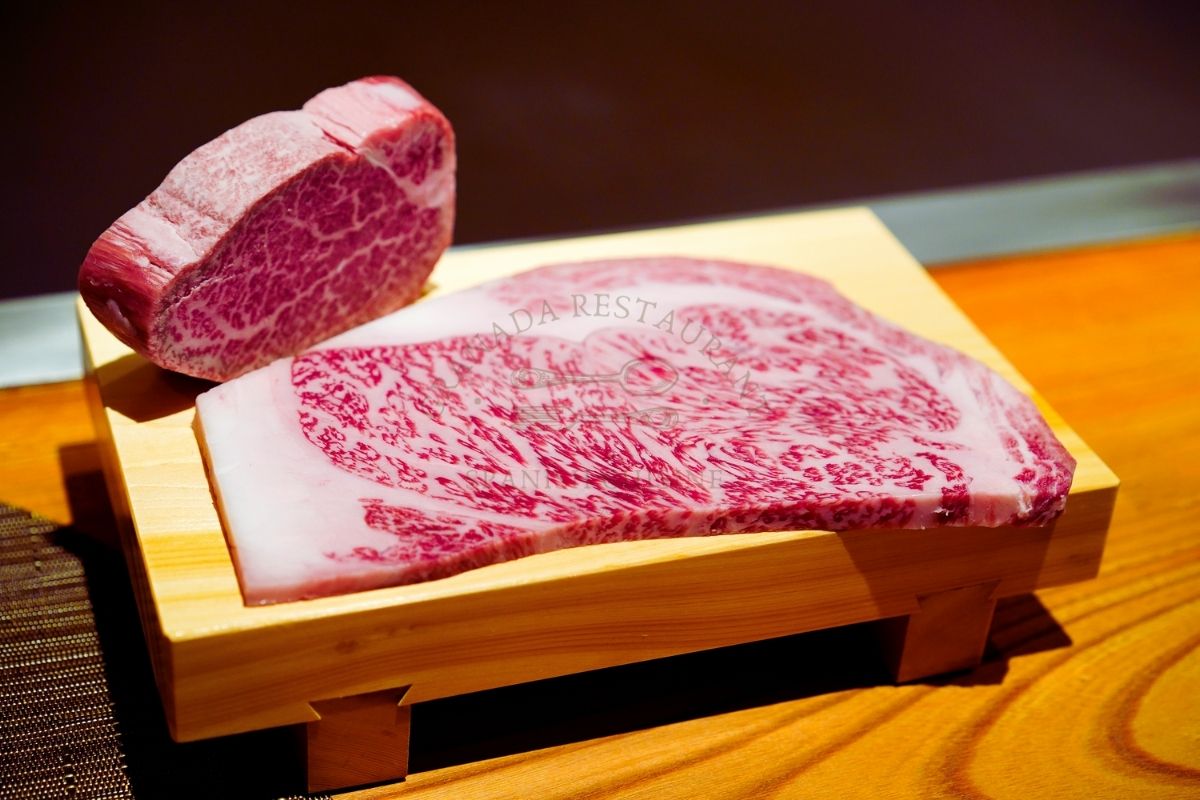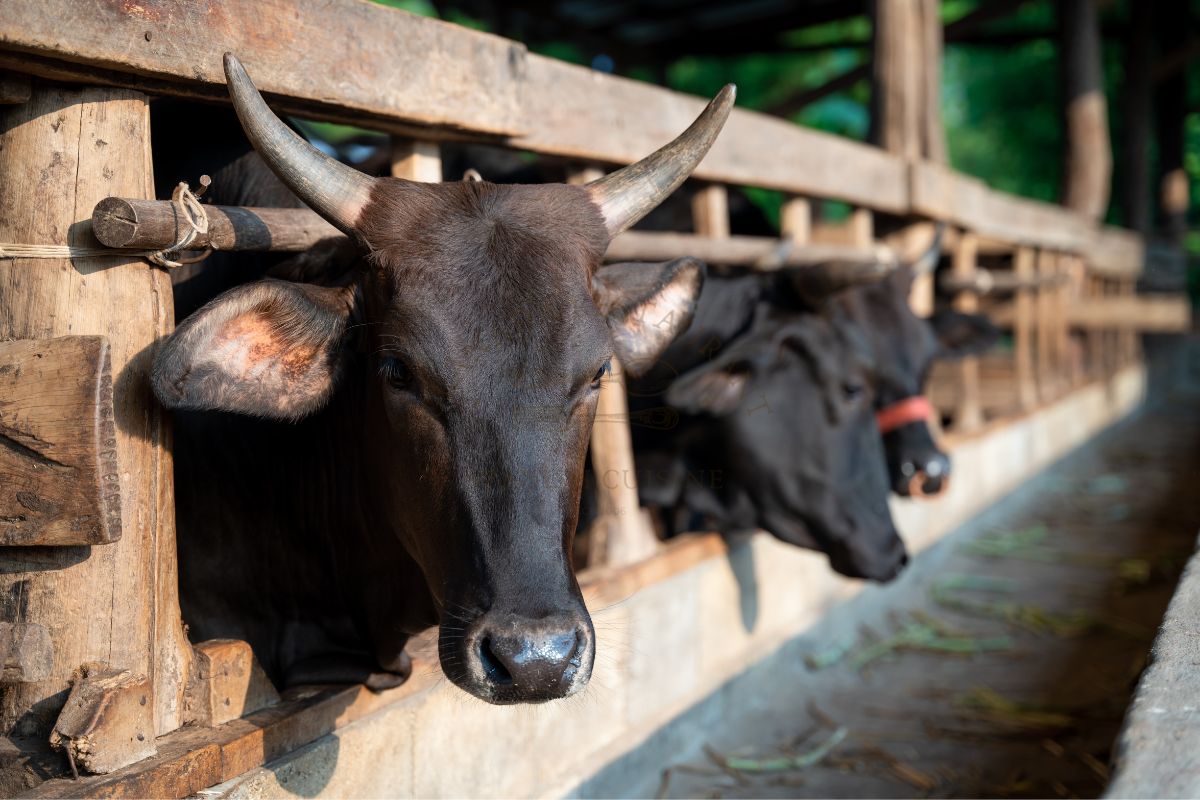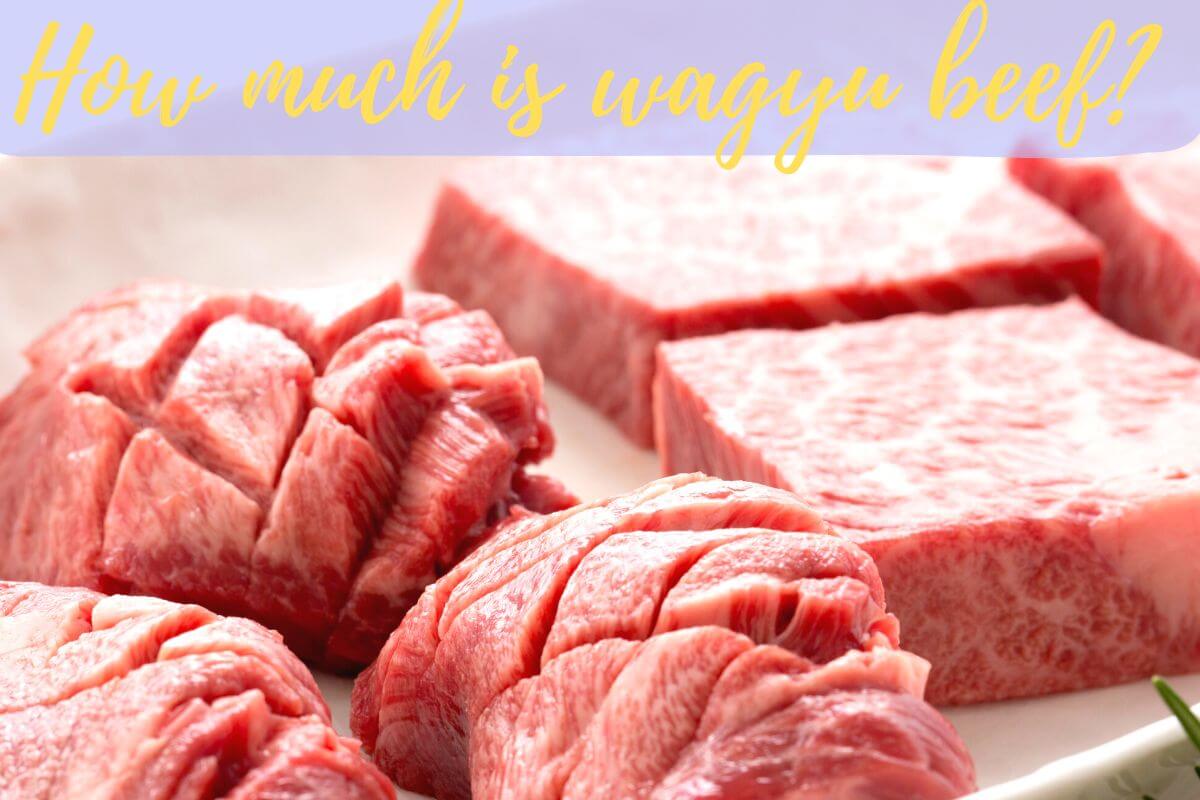Wagyu beef is renowned around the world for its rich, marbled texture and intense flavor. With a buttery, melt-in-your-mouth tenderness, this luxurious grade of meat has been gaining in popularity over the years due to increased global availability.
It’s also important to note that authentic Japanese wagyu, which is highly sought after for its high-quality marbling and flavor, can be significantly more expensive than domestic wagyu.
In this blog post, we’ll take a deep dive into things like what makes it so special, available cuts of Wagyu beef, and, ultimately, how much you can expect to pay for it.
With all of the information within reach, you will be able to make an informed decision on whether or not the treat of eating Wagyu is worth splurging on!
How Much is Wagyu Beef?
The cost of wagyu beef varies depending on various factors, such as the specific cut, the grade of the meat, and the location of the purchase. On average, wagyu beef can cost anywhere from $30 to $200 or more per pound. High-end cuts, such as wagyu filet mignon or ribeye, can cost upwards of $100 per pound.
What is Wagyu beef
Wagyu beef, also called Kobe beef, comes from a special breed of Japanese cattle that is known for its flavor and intense marbling. The way the fat is mixed in with the muscle tissue gives Wagyu a unique texture and flavor that many people think is unmatched in the world of high-quality meats.
Before they are turned into steaks, roasts, and other cuts of meat, these cows are raised with great care. They are often fed a special diet and given more time to grow up. Because of these efforts, the quality of beef is better than any other type of animal protein on the market right now.

The origins of Wagyu beef can be traced back to the Japanese prefecture of Kobe in the late 19th century. It was here that farmers began a selective breeding program with the goal of producing cattle that were both hardy and able to withstand the cold winters of Japan while still possessing excellent marbling, tenderness, and flavor.
This program’s results proved extraordinary, and the name “Kobe” became synonymous with high-quality Wagyu beef that was exported worldwide. Over time, other prefectures in Japan began participating in similar breeding programs and producing their own unique varieties of Wagyu beef.
Today, there are over 100 distinct breeds of Wagyu cattle, each with its own unique flavor profile and marbling patterns.
Factors Affecting the Price of Wagyu Beef
Quality grading
This is a key factor in determining the price of wagyu beef. Cuts are graded based on factors such as marbling, texture, color, and firmness. The higher the grade, the more expensive the cut will be.
In addition to grading, location is another important factor that affects cost. Wagyu beef shipped from Japan can be significantly more expensive than domestic varieties, as the cost of importing and exporting is factored into the price.
Type of cut
The type of cut will also impact how much wagyu beef costs. For example, steaks like filet mignon and ribeye tend to be more expensive because they come from the more tender areas of the cow.
On average, you can expect to pay anywhere from $30 to $200 or more per pound for wagyu beef, depending on the abovementioned factors.
Read More: Air Fryer Showdown: Cosori vs Ninja to Find the Winner!
Breed and genetics
These factors also affect the cost of wagyu beef. Some breeds, such as A5 and Tajima, are highly sought after for their superior marbling and flavor. These varieties tend to be more expensive due to their rarity and exclusive genetics.
Location of production
The location of production can also influence the cost of wagyu beef. Wagyu produced in Japan is typically more expensive due to the costs associated with importing and exporting. However, domestic wagyu producers are becoming increasingly popular,, and their products may be less costly.
Supply and demand
Supply and demand also play a role in determining the price of wagyu beef. When there is an increased demand for the product, prices tend to rise due to scarcity.
Processing and packaging
Finally, the cost of wagyu beef may also be affected by processing and packaging expenses. When a cut is processed or packaged for sale, it can increase the per pound price significantly.
Grading System for Wagyu Beef
Japan Meat Grading Association (JMGA)
JMGA and Japan Livestock Technology Association (JLTA) both have their own grading systems for wagyu beef.
JMGA grades are based on the amount of marbling, firmness and texture, color and luster, fat quality, and overall yield. The grade is then determined by combining all five criteria using a numerical value from 1-12, with 12 being the highest quality.
JLTA grades are based on marbling, color and brightness of meat, firmness, texture of fat, and overall yield. The grade is then determined by combining all four criteria using a numerical value from 1-5, with 5 being the highest quality.
The pricing of wagyu beef can vary greatly depending on the grade, breed, location of production, and other factors. In general, higher grades tend to be more expensive due to their superior quality. Some of the highest-grade cuts can cost as much as $200 or more per pound.
Comparison with USDA grading system
The USDA grading system is also used to evaluate the quality of beef but in a different way. The USDA grades are based solely on marbling and do not consider other factors, like JMGA or JLTA. The grades range from Prime (highest quality) to Choice and Select (lowest quality).
When comparing the different grading systems, it is important to note that the USDA system does not take into account all of the factors considered when evaluating wagyu beef. As such, a cut of beef graded as Prime using the USDA system may not necessarily be equivalent to an A5 grade using the JMGA or JLTA systems.
Regional Differences in Price

Wagyu beef prices can vary significantly between countries due to regional differences in production, import/export costs, and supply and demand.
On average, wagyu beef produced in Japan tends to be the most expensive due to its rarity and high quality.
- Australian wagyu is typically less expensive than Japanese varieties due to a more readily available supply and lower import/export costs.
- Wagyu beef produced in the United States can also vary greatly in price depending on the breed, grade, and other factors.
The cost of wagyu beef can vary significantly between countries due to the differences in production, import/export costs, and supply and demand.
In addition, the price will depend on the breed, grade, location of production, processing and packaging expenses, as well as other factors. The highest quality cuts of wagyu can be quite expensive, with some costing as much as $200 or more per pound.
Frequent Asked Questions
What is the difference between Kobe beef and Wagyu beef?
Kobe beef is an expensive form of wagyu beef that comes from the Tajima strain of Wagyu cattle raised in the Hyogo region of Japan. Kobe beef has higher levels of fat marbling, a firmer texture, and is more tender than other types of wagyu.
Is Wagyu beef worth the price?
Yes, wagyu beef is worth the price due to its superior quality and taste. Wagyu beef has higher levels of fat marbling, a firmer texture, and is more tender than other types of beef. In addition, it is also known for its intense flavor and rich umami taste.
Is Wagyu beef healthier than other types of beef?
Wagyu beef is not necessarily healthier than other types of beef, but it has higher levels of fat marbling and a firmer texture, making it easier to digest. In addition, wagyu beef also contains beneficial fatty acids that can help reduce cholesterol levels and promote healthy heart function.
Read: Wine Wisdom: The Low-Down on Calorie Content of Chardonnay
What is the best way to cook Wagyu beef?
The best way to cook wagyu beef is through grilling or broiling. The high levels of fat marbling help keep the meat moist and tender, while allowing it to develop a delicious crispy exterior. Try marinating your wagyu beef before grilling or broiling for extra flavor and texture.
Where can I buy authentic Wagyu beef?
Authentic wagyu beef can be purchased from specialty butchers, online retailers, and some grocery stores. If you are looking for the highest grade of wagyu beef, purchasing it directly from Japan or Australia is best.
What are the best cuts of Wagyu beef?
The best cuts of wagyu beef depend on how you plan to cook the meat. For grilling or broiling, ribeye steaks and striploin steaks are great options. Other popular cuts are chuck rolls, sirloin, and briskets for slow-cooking dishes like stews and roasts.
How is Wagyu beef prepared and cooked?
Wagyu beef is typically prepared by dry- or wet-aging it to help tenderize the meat. When cooking wagyu, it is important not to overcook it, as this will reduce the flavor and texture of the beef. Grilling or broiling are preferred methods for cooking wagyu, but other methods like roasting and braising can also be used.
How long does Wagyu beef last?
For the best flavor and texture, Wagyu beef should be cooked and consumed within two days of purchase. Wagyu beef can last up to five days if stored properly in a refrigerator. It is important to keep the meat wrapped in plastic or a sealed container to keep moisture and freshness.
After reading this post, you now know what Wagyu beef is and how it differs from other types of beef. You also know about the different grades of Wagyu beef and what factors contribute to those grades. Finally, you understand why Wagyu beef is so expensive. Now that you have all this information, you can make an informed decision next time you’re at the grocery store or menu planning for a dinner party. Will you splurge on Wagyu beef? Or stick to something more economical? The choice is yours!
Further Reading:
- The Japanese Wagyu beef industry: current situation
- How to Cook Wagyu Beef – wikiHow
- How to Cook a Great Tasting Steak

I am Benjamin Nunez, and I love Spanish food, Italian food, and seafood. I have worked in kitchens all my life. I started as a dishwasher when I was just a teenager, and worked my way up to being a head chef.
I specialize in Spanish cuisine, but I can make any kind of Italian or seafood dish you want. My kitchen is always open! Website: https://granadarestaurant.com/

